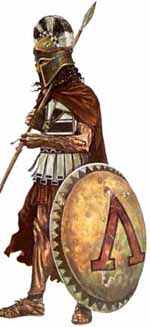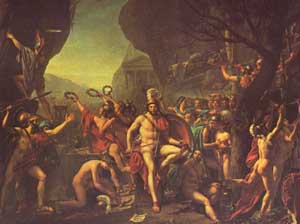Historical Inaccuracies
“See, look, I . . . I know I’m homophobic, but not about gay guys. They don’t bother me at all. It’s straight guys who don’t know they’re gay. They %&*# my $#!@ right up.”
– King Missile, Gay or Not Gay
The Battle at Thermopylae, when 300 Spartans led 5,000 Greeks against a Persian army 2.6 million strong, is considered by many the first great clash between Western and Eastern cultures. Some historians argue that if the Persians had successfully invaded Greece it would have changed the face of Western civilization forever, possibly even erasing the concept of Democracy.
What a shame then that Zack Snyder’s adaptation of Frank Miller’s graphic novel 300 had me wondering so early on, When are the Persians gonna hurry up and kill these guys?
Firstly, I have to take a critical eye to the film’s alleged historical accuracy. Putting aside the trolls, trollocs, giants, zombies, and other fantasy fiction staples comprising the Persian army in the film, or transforming Ephialtes of Trachis into a deformed hunchback, the film still has a great deal of historical accuracy in its depiction of… well… very little of substance in the film is true to history.
While true that Spartan boys were indoctrinated into military life at a very young age, the Hoplites, or Spartan warriors, initiation rites did not involve killing wolves, but Helots, who were the Spartans slaves, doing all the menial labor so the Spartans could enjoy their warrior-class lifestyles.
 Spartan Hoplite |
Secondly, I submit the following historically-accurate picture of a Hoplite for comparison to the red-caped, bikini-clad heroes from 300. The Spartans actually wore armor. They didn’t dress like Chippendale dancers like this film portrays them. I kept waiting for the King Leonidas and the other Spartan warriors to fling off their capes and start gyrating their hips so the Persian army could stick dollar bills in their leather Speedos, but I suppose the slow-motion “warnography.” as one critic put it, came close enough to make a few overly-excited fanboys wet their pants.
But the film warns us not to apply any homoeroticism to the Spartans’ many six-pack abs, swollen pectorals, and bulging packages. King Leonidas asserts his heterosexuality by making love to his queen and calling their allies, the Athenians, “Boy lovers.” However Anton Powell’s book “Athens and Sparta” states, “references to particular homosexual attachments of Spartans are conspicuous even by Greek standards (source)” The Athenians term for sodomy was to “Spartanize” someone.
But this confuses homosexuality with pedophilia and stereotypes homosexuals as lacking masculinity, and one thing neither history nor this film can deny is that the Spartans were definitely macho. In the film, when King Leonidas leaves his wife to go North into battle, he does not say anything, and the narrator makes sure we the audience understand that Spartans don’t say goodbye. They’re too tough for that, and Sparta is a hard land, where you can’t be soft in any way, and that means being hard, and being hard means not saying goodbye to your wife when you go away to battle. In case this extrapolation is too subtle for you, the point is that Spartans are tough.
Now compare this with what historians think he actually did say:
Plutarch mentions in his Sayings of Spartan Women that, after encouraging him, Leonidas’ wife Gorgo asked what she should do on his departure. He replied, “Marry a good man, and have good children.” (source)
How friggin’ cool is that? Why leave out this brilliantly poetic statement? This single sentence says so much more than Miller’s overly-verbose narration, which violates the show don’t tell principle of storytelling. The actual history is so much more fantastic than Miller’s silly comic book drama-kings.
To let the movie tell it, the Spartans completely went it alone. Sure, a small band of Greeks showed up, but they were just a bunch of farmers, not warriors, plus they only fought in one scene in the film and they quickly broke ranks and ran away. The Spartans also had a little bit of luck on their side, when storms sank part of the Persian navy–but mostly it was just those 300 incredibly brave nearly super-human Spartans who fought almost continuously for three days against wave after wave of the Persian army. They even named the film 300 to emphasize how utterly independent and all alone and strong and courageous these Spartans were and stuff.
In the actual battle, the 300 Spartans led an army of over 5,000 Greeks, who fought in rotating shifts throughout the battle, 700 of whom remained with the Spartans to fight in the final assault after the rest of the army decided to flee. Their valiance held off the Persian army long enough for the Athenean-led Greek naval forces to destroy the Persian navy in the Battle of Salamis.
The historical poppycock bothers me because I know I’m now going to get into an argument with some fanboy any day now about Spartan homosexuality, apartheid, or valor where the geek is going to reply, “Yeah, but in the movie 300 it showed blah blah blah…” Or some kid’s going to tell his younger brother the film as though it were historical truth. It’s historical disinformation, which brings people down, while historical veracity uplifts.
Ethical Problems
 Leonidas at Thermopylae |
One could argue that there are timeless themes in 300 and those are what’s important, just like in the Lord of the Rings. It’s just fantasy, and we should view the film as a romantic idealization of the Spartan battle, that removing the Spartan’s armor and portraying the Persians as monsters were purely artistic choices made for dramatic effect. But even putting all of these historical innaccuracies aside, the film remains offensive for its internal logic, or lack thereof.
In the movie, as in real life, the Spartans abandon their newborns to die on Mt. Taygetos if they were deemed lacking in vitality. The film gives Ephialtes, who betrayed the Greeks, the backstory of being a deformed infant who’s parents refused to kill him. Leonidas refuses Ephialtes’ request to fight alongside the Spartans because he is too deformed to raise his shield. How convenient this explanation for the Spartan policy of eugenics. Instead of admitting the Spartans had some serious cultural flaws, the film actually tries to rationalize infanticide rather than admit some gray areas that might cloud its tale of ultimate good versus ultimate evil.
And what evil. The Persians come in horrific waves. First there’s the fat monstrous black men with eyes that appear disembodied in the night. Then come the Asian hordes, dressed in Oriental garb and weilding samurai swords. These are followed by burka-wearing arabian wizards. To top it all off is big gay Xerxes, who’s tent is filled with lesbian amputees.
So by “Persian” the film really means blacks, asians, arabians, and homosexuals. The Persians are the evils of multiculturalism come to overthrow the valiant, scantily-clad white guys. But our bare-chested warriors are ready for them.
“Freedom is not free,” queen Gorgo observes. The small band of Spartans are fighting all by their lonesome in the mountains for their “freedom.” They are fighting Persian tyranny and slavery. They are fighting for their right to live their own way, to own slaves, to commit infanticide on children born imperfect, to forcibly rip children from their mothers arms and indoctrinate them militarily by forcing them into violent combat with one another. Every time the Spartans would cry “Freedom!” I was reminded of Inigo Montoya’s statement from The Princess Bride, “You keep using that word. I do not think it means what you think it means.”
300 embodies all that is wrong in the disconnect between thought and action when we talk about freedom and democracy. That these aren’t just words you scream at the top of your lungs that somehow make you a better person, you must live these concepts, understand what they mean and strive to make them part of your daily life.
Many reviewers, historians, and bloggers have wondered what Western civilization would look like today were it not for the battle at Thermopylae. What would have happened if Greek democratic ideals had been conquered by Persian imperialism, replacing the Senate with a Monarchy?
We already know because history shows us what did happen. When Christianity conquered Western civilization, the Catholic Church imposed god-appointed kings and abolished all the philosophies and discoveries of Ancient Greece. It was called the Dark Ages, when myth and supersition overruled facts and rationality. Anyone who sees the myths portrayed in the film 300 has a responsibility to learn the reality and context of the Battle of Thermopylae.
There would be other battles, both military and ideological, equally important to the survival of Western civilization, and its concepts of democracy and egalitarianism. Many times throughout history Democracy would be ursurped whether from barbarians sacking Rome or Christian kings vanquishing it for centuries. Every time it comes back more powerful than before. That’s because democracy is a meme that works, not some mythological flag to wave thoughtlessly.